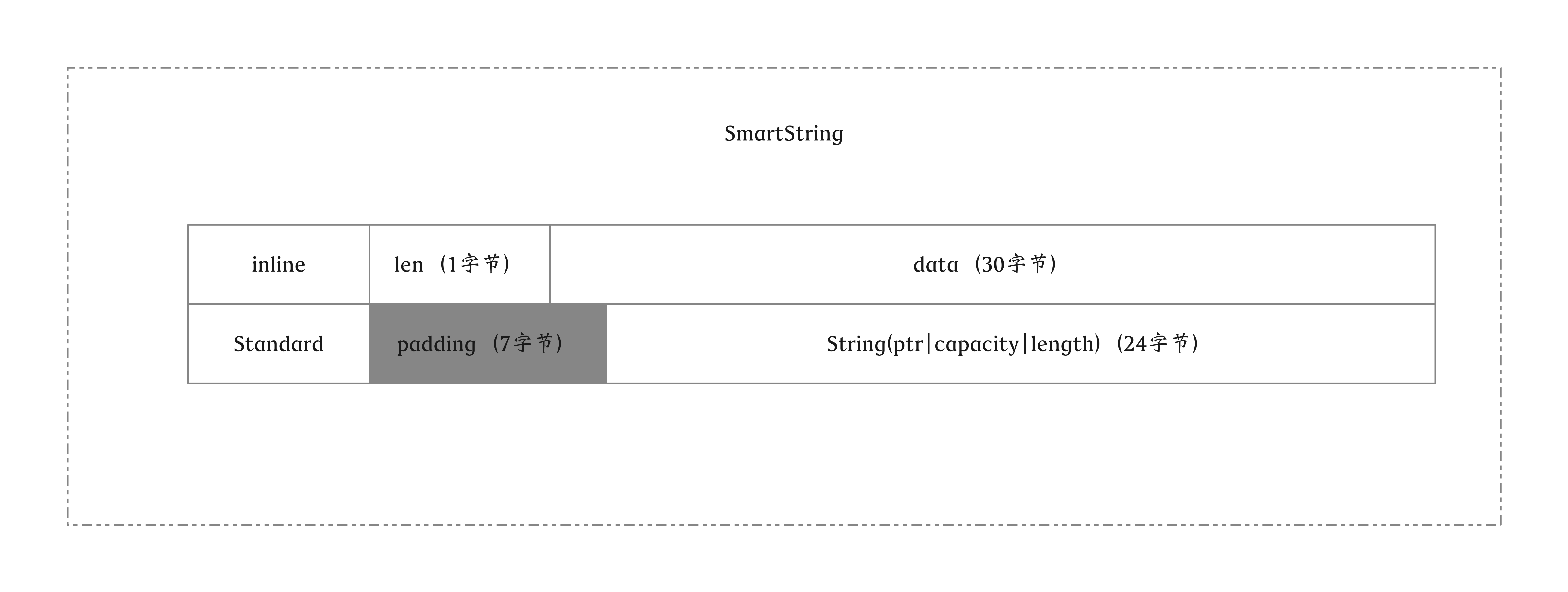1
2
3
4
5
6
7
8
9
10
11
12
13
14
15
16
17
18
19
20
21
22
23
24
25
26
27
28
29
30
31
32
33
34
35
36
37
38
39
40
41
42
43
44
45
46
47
48
49
50
51
52
53
54
55
56
57
58
59
60
61
62
63
64
65
66
67
68
69
70
71
72
73
74
75
76
77
78
79
80
81
82
83
84
85
86
87
88
89
90
91
92
93
94
95
96
| use std::{fmt, ops::Deref, str};
const INLINE_STRING_MAX_LEN: usize = 30;
struct InlineString {
len: u8,
data: [u8; INLINE_STRING_MAX_LEN],
}
impl InlineString {
fn new(input: impl AsRef<str>) -> Self {
let bytes = input.as_ref().as_bytes();
let len = bytes.len();
let mut data = [0u8; INLINE_STRING_MAX_LEN];
data[..len].copy_from_slice(bytes);
Self {
len: len as u8,
data,
}
}
}
impl Deref for InlineString {
type Target = str;
fn deref(&self) -> &Self::Target {
str::from_utf8(&self.data[..self.len as usize]).unwrap()
}
}
impl fmt::Debug for InlineString {
fn fmt(&self, f: &mut fmt::Formatter) -> fmt::Result {
write!(f, "{}", self.deref())
}
}
#[derive(Debug)]
enum SmartString {
Inline(InlineString),
Standard(String),
}
impl Deref for SmartString {
type Target = str;
fn deref(&self) -> &Self::Target {
match *self {
SmartString::Inline(ref v) => v.deref(),
SmartString::Standard(ref v) => v.deref(),
}
}
}
impl From<&str> for SmartString {
fn from(s: &str) -> Self {
match s.len() > INLINE_STRING_MAX_LEN {
true => SmartString::Standard(s.to_owned()),
_ => SmartString::Inline(InlineString::new(s)),
}
}
}
impl fmt::Display for SmartString {
fn fmt(&self, f: &mut fmt::Formatter) -> fmt::Result {
write!(f, "{}", self.deref())
}
}
fn main() {
let len1 = std::mem::size_of::<SmartString>();
let len2 = std::mem::size_of::<InlineString>();
println!("Len: SmartString {}, InlineString: {}", len1, len2);
let s1: SmartString = "hello world".into();
let s2 = SmartString::from("这是一个超过了三十个字节的很长很长的字符串");
println!("s1: {:?}, s2: {:?}", s1, s2);
println!(
"s1: {}({} bytes, {} chars), s2: {}({} bytes, {} chars)",
s1,
s1.len(),
s1.chars().count(),
s2,
s2.len(),
s2.chars().count()
);
assert!(s1.ends_with("world"));
assert!(s2.starts_with("这"));
}
|
